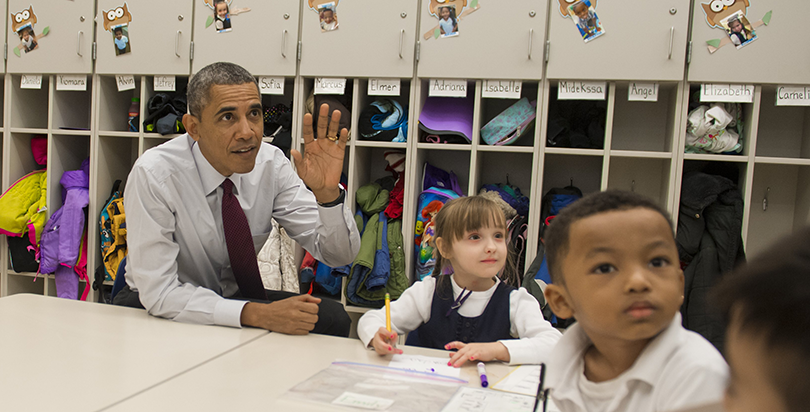Don’t like President Obama? Then you probably don’t like the Common Core — or as some conservative critics call it, “ObamaCore” — according to new research, looking at what factors predict opposition to the controversial standards adopted in most states.
Outside an unpopular view of the president, the paper found that opinions on testing and school funding, and certain perceptions (and misconceptions) about the standards were correlated with opposition to Common Core.
The research — conducted by Morgan Polikoff, Tenice Hardaway, and Julie Marsh of the University of Southern California, as well as David Plank of Stanford — relies on a 2015 California poll showing mixed opinion, and widespread misinformation about the Common Core. The latest study uses that polling data to determine what characteristics are related to views about the standards.
The research confirms what many have long suggested: President Obama and the Common Core have become inextricably entangled. Although the Obama administration had nothing to do with the creation of the standards, which began as a bipartisan initiative of the National Governors Association, the administration incentivized states to adopt them through its Race to the Top competitive grants.
Disapproval of Obama was strongly associated with opposition to Common Core, causing the paper’s authors to suggest “the results of the upcoming presidential election may decrease opposition somewhat.” Feelings about Obama were an even stronger predictor than political party identification.
But this effect likely cuts both ways: the link to Obama may have strengthened backing for the standards among the president’s supporters. So while Common Core’s association with the president appears to have alienated his opponents, the same phenomenon may have bolstered a favorable view of the standards among Obama’s fans. With the potential of affecting public opinion in both directions, it’s not clear whether Common Core wins or loses in that tug-of-war.
“My guess would be that it’s a net negative, but I don’t think that we have good empirical evidence on that,” said Polikoff, the study’s lead author.
The research might suggest that, as the upcoming presidential election takes shape, Donald Trump’s fierce (and factually challenged) opposition to Common Core could boost opinions of the standards among his detractors.
The study found that opposition to the standards was stronger among those believing schools receive sufficient funding and those opposed to standardized tests. Also positively associated with disliking the Common Core was an increase in claimed knowledge about it — though voters stating familiarity with the standards were actually likely to hold certain misconceptions about them, according to the original poll. Indeed, the incorrect belief that states are not allowed to add content to the Common Core was associated with skepticism about the standards.
There was no difference in support between parents with children in public schools and those without. This suggests that, at least in California, opposition to the standards isn’t driven by parents perplexed by seemingly confusing Common Core-aligned assignments.
The 74 Video: Math 2.0 Common Core Explained

Finally, the belief that Common Core limits teacher creativity was strongly connected to greater opposition. Polikoff, though, points out that there’s no evidence this notion is true, and, in fact, in a recent survey the majority of teachers stated that their autonomy had stayed the same or increased under the new standards.
An important limitation of the study is that it examined public opinion only in California, a liberal state that has not used test scores to rank schools for three years’ running and has seen little organized resistance to the standards.
Caveats aside, the findings suggest that opposition to the Common Core doesn’t seem to be just about the Common Core. There has long been anecdotal evidence of this. For instance, The 74 previously reported on Common Core opposition in New Hampshire, in which one top opponent linked the standards to an elaborate tracking system designed to funnel students into certain careers, including encouraging them to become rappers.
A series of conspiracy theories have also cropped up about Common Core, positing, for example, that it’s designed to indoctrinate students in Islam. Republican governors and candidates began swiftly flip-flopping on the issue once the standards became linked to Obama.
“To me, the broader takeaway is … that opposition to Common Core is largely driven by views about other things: the president, testing, [and] local control,” said Polikoff
Get stories like these delivered straight to your inbox. Sign up for The 74 Newsletter


;)
